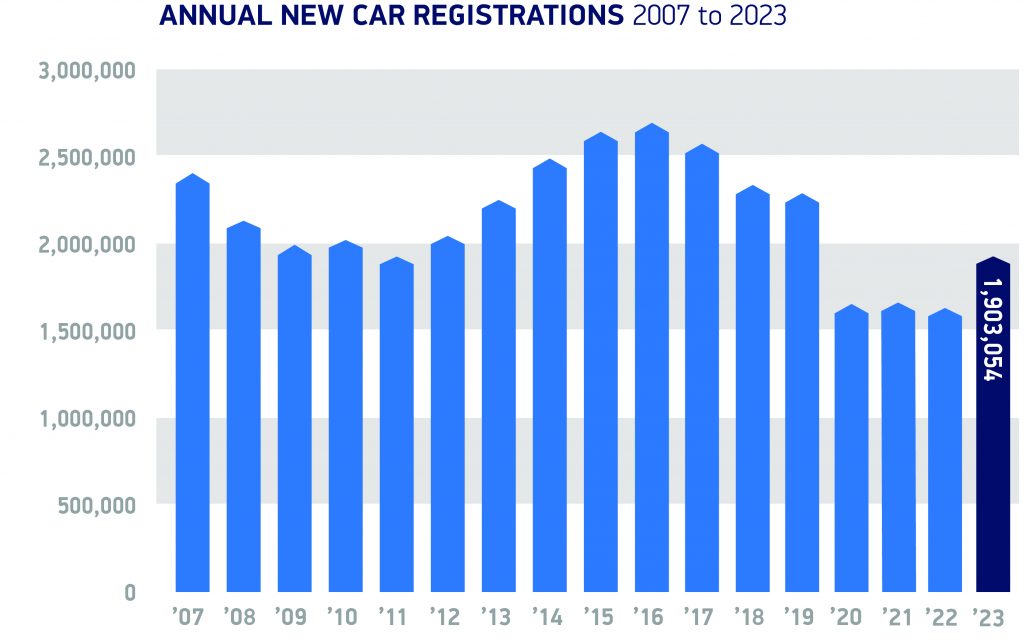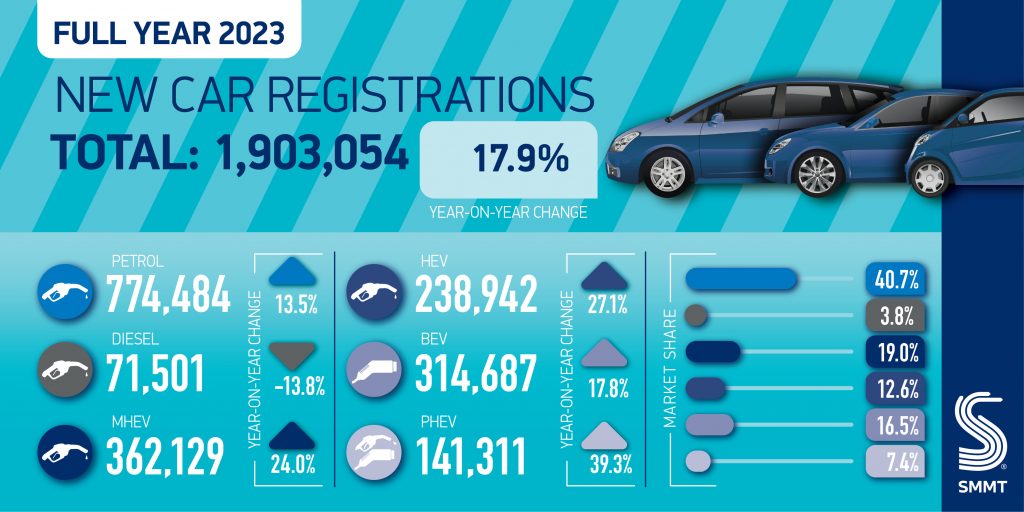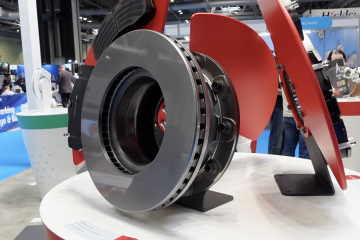For the 17th consecutive month, new-car registrations in the UK grew in December as the industry gets back on its feet following years of disruption. However, the latest figures suggest the recovery is starting to slow, while enthusiasm around battery-electric vehicles (BEVs) is waning.
Data released by the Society of Motor Manufacturers and Traders (SMMT) shows that last month, there were 141,092 new-car registrations in the UK, up by 9.8% over the same month in 2022. While positive, this marks the second month in a row, and the second time in 2023, that the monthly increase has been in single figures. Since the high of July, which saw a 28.3% rise, the numbers have fallen each month, with December on par against November’s 9.8% increase.
This suggests that while new-car registrations remain positive, the market could be slowing. This would make sense when comparing figures with the last few years. The entire automotive industry was hit by the COVID-19 pandemic with disruption in 2020 and 2021, while at the end of 2021 and into the first seven months of 2022, a supply-chain crisis caused vehicle deliveries to stall.
The later part of 2022 saw new-car registrations increase massively following months of declines, and it is impressive that the market has continued to improve against the rush of deliveries that were seen between August and December of that year.
Across the whole of 2023, there were 1.9 million new-car registrations, the best year since the pre-COVID-19 yardstick of 2019. However, December was down 5.3% compared to the same month in 2019, while the year itself was down 17.7% in comparison.
Fleets drive new-car registrations
Private consumer demand fell by 14% in December's new-car registrations figures, while across the year it remained stable, with a 0.1% decline. With the cost-of-living crisis and high-inflation impacting the purchasing decisions of many, this stability is an achievement.
This is especially true when considering that at the end of 2022, carmakers were prioritising deliveries to individuals rather than businesses. But the declines in private sales in recent months may cause concern into 2024.

It was up to the fleet market to again prop up the new-car registrations figures with a 32.9% increase in deliveries last month, and a 38.7% improvement across the whole year. Business registrations fell 47.3% in the month, but these only make up a small proportion of the market. In the whole of 2023, business registrations declined just 1.5%.
The fleet market is more crucial to the UK aftermarket, as these models are almost guaranteed to enter the used-car sector in three years, at which time they are likely to enter independent workshops. Private buyers may choose to hold onto their new vehicles for longer, especially in the current financial climate.
Positives for internal-combustion engines
Including mild hybrids, petrol remained the most popular powertrain type in December, and across the year. The fuel grew its new-car registrations by 35.6% in the month, and 18.1% in 2023, with a market share of 56% over the 12-month period.
Diesel also experienced a positive month in December, a rarity for the fuel in these times. Including mild hybrids, it saw an increase in deliveries of 12%, although its yearly total fell by 8.3%. This meant diesel’s market share for the year dropped, from 9.6% in 2022, to 7.5% last year.
Hybrids led the way in the low- and zero-emission category, with robust growth of 18.5% in the month and 27.1% in the year, leading to a 12.6% market share in 2023. PHEVs also performed well up 45.4% in the month and 39.3% over the 12 months. However, their 7.4% market share, an increase on 2022’s total of 6.3%, meant it missed out on overtaking diesel, and remains the country’s least-popular powertrain.
Are BEVs in crisis?
The biggest surprise in the new-car registration figures was the performance of BEVs. While the technology has flown high across the year, the last quarter has seen deliveries slump. December was the worst-performing month for the powertrain in growth terms, with registrations falling 34.2%, as 27,841 units took to roads. This impacted the BEV yearly performance. While new-car registrations across 2023 grew by 17.8%, the market share stalled, its 16.5% yearly figure slightly down from the 2022 mark of 16.6%.

However, this is not a statement on the popularity of battery-electric vehicles. Instead, it is a set of circumstances that have led to the market normalising in December 2023, while carmakers look ahead to their registrations in 2024.
The industry came to the end of a disrupted year in 2022 due to the supply chain crisis, yet while backlogs were clearing for petrol and diesel models, BEV deliveries were still being rushed through. As it takes longer to produce a BEV than it does for internal-combustion engine models, and as carmakers make less profit on each BEV they sell, these models were the latest to be delivered to customers following the easing of supply restrictions. Therefore, December 2022 represented a push to get these vehicles to customers.
Many carmakers will have had internal targets for annual EV deliveries, as well as those for CO2 emissions. pushing to get deliveries of zero-emission vehicles by the end of the year would have benefitted them, meaning an abnormal number of BEVs were registered in December 2022.
To highlight this, BEVs enjoyed their biggest-ever market share in the last month of 2022, with 32.9% of all registrations, and an increase of over 14,500 compared to 2021. To put this into perspective, petrol registrations improved by 43 units, and hybrids by 5,053. The huge increase pushed the BEV market share for the year from around 15% in November 2022 to 16.6% by the year end.
Even the end of 2021 saw a larger number of BEVs registered than usual, with a 25% market share the biggest at the time. Comparing December 2023 to that month, and the numbers are on par, with around 140 units difference. But there is another reason why this time, carmakers were not so keen to push zero-emission deliveries in the last month of the year.
The new ZEV mandate, which came into effect from 1 January this year, tasks vehicle manufacturers with ensuring that 22% of total sales in 2024 are made up of zero-emission vehicles. This will be especially difficult for those carmakers who only have one or two BEV models in their range. Therefore, many companies will have held back on deliveries, pushing them into January, where they will count towards their ZEV mandate target. This may also account for the slower pace of registrations in November 2023. Should manufacturers miss this 22% threshold, and not have enough credits to cover the difference, they will face fines of £15,000 per vehicle.
With many early adopters having already purchased their BEVs, the challenge now is to convince more drivers to switch. This is not helped by a poor charging infrastructure, increasing electricity costs, and negative media coverage, meaning it is more than likely carmakers delayed deliveries to take advantage of the numbers. This means January's BEV figures should post positive results.
Therefore, the BEV market is not in crisis, but has stabilised. The 16.5% market share for the whole of 2023 is above that of the first 11 months of 2022, before the anomaly of December. Do not be fooled by the reports of demise, with EV training still crucial, especially as the ZEV mandate will lead to an aggressive push in sales of zero-emission technology each year until the 2035 ban on new petrol and diesel models.
Mike Hawes, SMMT Chief Executive, commented: “With vehicle supply challenges fading, the new car market is building back with the best year of new-car registrations since the pandemic. Energised by fleet investment, particularly in the latest EVs, the challenge for 2024 is to deliver a green recovery. Government has challenged the UK automotive sector with the world’s boldest transition timeline and is investing to ensure we are a major maker of electric vehicles. It must now help all drivers buy into this future, with consumer incentives that will make the UK the leading European market for ZEVs.”
Looking ahead to 2024, the latest SMMT market outlook – published in November – anticipates 2024’s new car market to reach 1.97 million units, with 439,000 BEVs taking a 22.3% market share.




You must be logged in to post a comment.